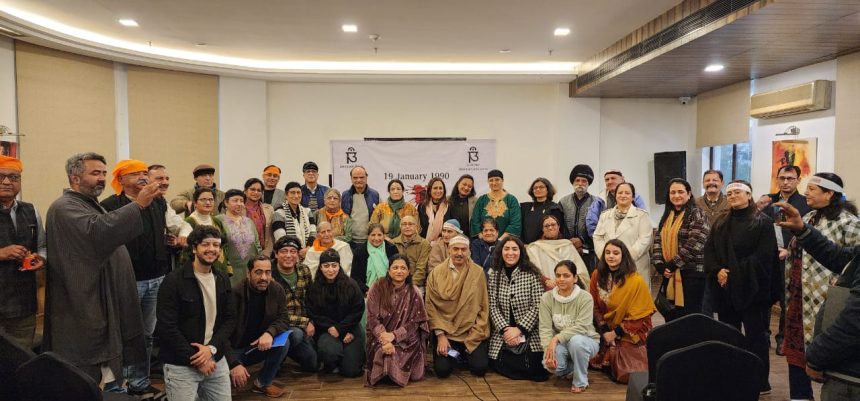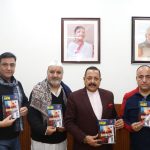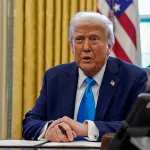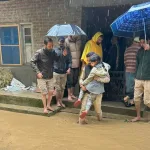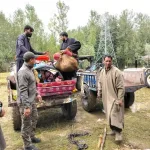Srinagar, Jan 19: The Sashekt Nari Samelan organized an event in Gurgaon to commemorate Exodus Day of 1990, honoring the struggles and resilience of the Kashmiri Pandit community which brought together prominent voices advocating for their return to the Kashmir Valley.
Speaking on the occasion, Senior advocate and Kashmiri Pandit leader Ashok Bhan made appeal for the return of the displaced Kashmiri Pandit community to their ancestral homeland in the Kashmir Valley.
In his address, Bhan emphasized the importance of retrieving the roots of the Kashmiri Pandits and acknowledged the progress made by the Muslim-majority community in transitioning from turbulence and terror to democracy. He highlighted their large-scale participation in elections as a step towards creating an environment of hope for the return of displaced communities.
“A stable and robust security ecosystem against the designs of terrorists and their support structure is yet another assurance for the displaced community to come back,” Bhan said.
He further said that there is a growing societal yearning within the Muslim-majority community to welcome their displaced brethren.
He said that the collective efforts are required from both communities to revive and restore Kashmir’s essence of plural ethos, the rich cultural and spiritual heritage.
Bhan lauded the government’s massive development initiatives, including infrastructure projects like roads, railways, tunnels, and the establishment of IIMs, IITs, AIIMS, and universities in the region.
He further said that the booming tourism sector is an opportunity for all Kashmiris, particularly the displaced community, to return and contribute to the development of Naya Kashmir.
“Today, the people of Kashmir, through a wise vote, have rejected the death and destruction inflicted over the last three decades by terrorists and their supporters. They look towards the idea of India with hope for opportunities and a bright economic future.”
Ashok Bhan called upon his community to move past and look forward to building a modern and plural Naya Kashmir as their home. Simultaneously, he appealed to the Muslim-majority community to open their arms and hearts.
During the event, Raj Nehru described the current situation in Jammu and Kashmir as highly encouraging. He cited a recent scientific survey, which revealed that 60-65% of Kashmiri Pandits are longing to return to their homeland. The survey also found that 40% of the community members still have their properties intact, while 0.3% have purchased new properties in the valley.
Nehru refuted the myth propagated by vested interests that Kashmiri Pandits are unwilling to return. “This survey blunts the lie and has been made public and shared with the government,” he said.
He also stressed the deep spiritual connection of Kashmiri Pandits to the valley and stated that they would never be at peace until they return to their ancestral homeland. Nehru urged the union government and the LG administration to prioritize restoring the physical and religious infrastructure of shrines and endowments left behind by the community.
Nehru appealed to Kashmiri Muslim youth to view India as a land of opportunities with a robust constitutional framework, unlike neighboring countries.
Lady speakers, including Archana Dhar. Prof Dr Amita Malla Watal, Tanishka Kher, Ousha kher, Dr Surbi Goyal,Sonal Naik and Sardar Taljeet Singh among others highlighted the urgent need for the community to return to their roots. They expressed concerns about losing cultural and emotional linkages with Kashmir, leaving the younger generations disconnected and almost rootless.
They stressed that reversing the exile of Kashmiri Pandits was essential to instill a sense of heritage and confidence in their children.
Speakers at the event urged the government of India, LG administration, and political leadership to work together to prioritize the safe and dignified return of Kashmiri Pandits to the valley.
“The return of Kashmiri Pandits is vital for promoting peace, stability, and communal harmony, and for reinforcing the idea of India in the Valley,” they said.
They also emphasized that this is a matter of justice and human rights, asserting that the inalienable right of Kashmiri Pandits to live in their ancestral homeland must be restored.


